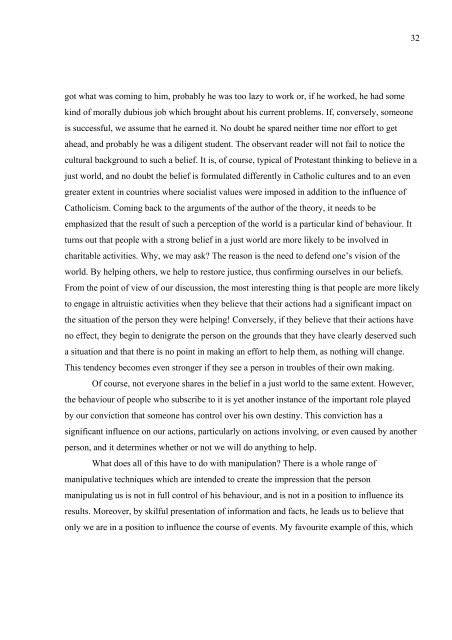PSYCHOMANIPULATION - Tomasz Witkowski
PSYCHOMANIPULATION - Tomasz Witkowski
PSYCHOMANIPULATION - Tomasz Witkowski
You also want an ePaper? Increase the reach of your titles
YUMPU automatically turns print PDFs into web optimized ePapers that Google loves.
got what was coming to him, probably he was too lazy to work or, if he worked, he had some<br />
kind of morally dubious job which brought about his current problems. If, conversely, someone<br />
is successful, we assume that he earned it. No doubt he spared neither time nor effort to get<br />
ahead, and probably he was a diligent student. The observant reader will not fail to notice the<br />
cultural background to such a belief. It is, of course, typical of Protestant thinking to believe in a<br />
just world, and no doubt the belief is formulated differently in Catholic cultures and to an even<br />
greater extent in countries where socialist values were imposed in addition to the influence of<br />
Catholicism. Coming back to the arguments of the author of the theory, it needs to be<br />
emphasized that the result of such a perception of the world is a particular kind of behaviour. It<br />
turns out that people with a strong belief in a just world are more likely to be involved in<br />
charitable activities. Why, we may ask? The reason is the need to defend one’s vision of the<br />
world. By helping others, we help to restore justice, thus confirming ourselves in our beliefs.<br />
From the point of view of our discussion, the most interesting thing is that people are more likely<br />
to engage in altruistic activities when they believe that their actions had a significant impact on<br />
the situation of the person they were helping! Conversely, if they believe that their actions have<br />
no effect, they begin to denigrate the person on the grounds that they have clearly deserved such<br />
a situation and that there is no point in making an effort to help them, as nothing will change.<br />
This tendency becomes even stronger if they see a person in troubles of their own making.<br />
Of course, not everyone shares in the belief in a just world to the same extent. However,<br />
the behaviour of people who subscribe to it is yet another instance of the important role played<br />
by our conviction that someone has control over his own destiny. This conviction has a<br />
significant influence on our actions, particularly on actions involving, or even caused by another<br />
person, and it determines whether or not we will do anything to help.<br />
What does all of this have to do with manipulation? There is a whole range of<br />
manipulative techniques which are intended to create the impression that the person<br />
manipulating us is not in full control of his behaviour, and is not in a position to influence its<br />
results. Moreover, by skilful presentation of information and facts, he leads us to believe that<br />
only we are in a position to influence the course of events. My favourite example of this, which<br />
32


